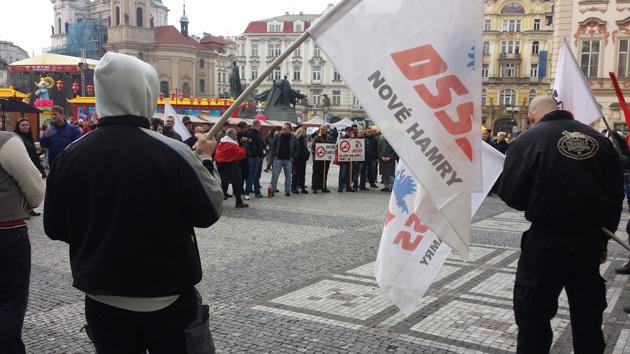Czech Interior Ministry says DSSS still in crisis, Islamophobia stronger than antigypsyism

Extremists in the Czech Republic convened 44 events during the first quarter of this year, 32 fewer than during the same period last year. The number of crimes related to extremism during the same period rose slightly year-on-year, from 46 in 2014 to 50 this year.
Those are the results of the most recent report about extremism issued by the Czech Interior Ministry’s Department of Security Policy. Left-wing extremists are said to have convened 29 events between January and March, while their right-wing opponents convened seven.
The other eight events were anti-Islamic protests and members of both scenes participated in them. "During the first quarter of 2015, the long-lasting crisis of the ultra-right scene intensified significantly. The theme of antigypsyism has retreated into the background. In connection with Islamist terrorist activities, the theme of Islamophobia has been increasingly advocated," the report states.
Traditional right-wing extremist groups have not succeeded in taking hold of this trend. For example, the Workers’ Social Justice Party (Dělnická strana sociální spravedlnosti – DSSS) convened a "Protest against immigration and Islamization" on 21 February on the Old Town Square in Prague.
"Given the minimal turnout for and slim media coverage of these events, they can be evaluated from the DSSS persepctive as fiascos," the report says. "New populist groups have taken the floor on this theme that accent a mixture of nationalism and xenophobia. Some of the followers of this populist wave who have political ambitions are reflecting the successes of anti-immigrant, Islamophobic or nationalist-oriented parties elsewhere in Europe."
In addition to this "political branch", the main role in this trend has been played by the "We Don’t Want Islam in the Czech Republic" group (Islám v České republice nechceme), which has held five larger demonstrations in Brno, České Budějovice and Prague. The authors of the report estimate that "it can be anticipated that in the short term, interest in its activities will decline, just as it did, e.g., for the German PEGIDA movement and its offshoots."
As far as the left-wing extremist scene is concerned, the report says that "a persistent mobilization theme for the anarchist scene in particular has been the Klinika initiative. After the building of a former pulmonary clinic was entrusted to the care of this platform by the state at the end of February, there were various events held there directly linked to promoting and supporting the anarchist scene. In connection with the anticipated end to the activities of the Klinika squat (given the Government’s decision to make it possible for the building to be used by the Inspector-General of the Security Forces) and the end of the Cibulka squat (the owner of that building no longer wants to lease it to the squatters), we can anticipate mobilization of the anarchist and squatter communities".
During the first quarter of 2015, police solved 24 extremism-related cases in which a total of 45 perpetrators were involved. Detectives had to address extremist crime most frequently in the Moravian-Silesian Region (nine cases) and in Prague (eight cases).
No cases of extremist crime were reported from the Karlovy Vary, Liberec or Pardubice Regions. During 2014, extremists convened 279 events in the Czech Republic.
That was seven more events than had been convened in 2013. The number of extremist crimes in 2014, on the other hand, fell year-on-year by 10 to a total of 201.